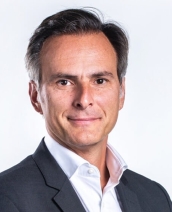Guillem Casahuga
Guillem combines broad telecom experience with deep expertise in Latin America to help clients transform their sales and marketing organizations.

Areas of Focus
Education
Past Experience

Guillem is a partner based in Arthur D. Little's Houston office.
He leads the Latin America TIME (Telecommunications, Information, Media and Electronics) Practice. His professional focus is on marketing and sales strategies, corporate and growth strategy, business transformation, customer experience management and operational performance improvement.
For many years, Guillem has assisted players in the telecom industry (mobile, fixed, broadband and pay-TV) across Latin American countries.
Guillem received his degree in Telecommunications Engineering from Polytechnic University of Catalonia in Barcelona and an MBA from ESADE, Spain.
He speaks 5 languages: English, Spanish, Portuguese, French and Catalan.

Transforming telcos through AI

Reshaping telecom investment in a next-generation world

Migrating to the next network

DESIGNING INSURANCE SALES CHANNELS FOR MAXIMUM IMPACT

Enabling a sustainable telco ecosystem

Rising inflation! How are telcos reacting?

Guillem is a partner based in Arthur D. Little's Houston office.
He leads the Latin America TIME (Telecommunications, Information, Media and Electronics) Practice. His professional focus is on marketing and sales strategies, corporate and growth strategy, business transformation, customer experience management and operational performance improvement.
For many years, Guillem has assisted players in the telecom industry (mobile, fixed, broadband and pay-TV) across Latin American countries.
Guillem received his degree in Telecommunications Engineering from Polytechnic University of Catalonia in Barcelona and an MBA from ESADE, Spain.
He speaks 5 languages: English, Spanish, Portuguese, French and Catalan.

Transforming telcos through AI

Reshaping telecom investment in a next-generation world

Migrating to the next network

DESIGNING INSURANCE SALES CHANNELS FOR MAXIMUM IMPACT

Enabling a sustainable telco ecosystem

Rising inflation! How are telcos reacting?
More About Guillem
- ESADE Business School (Spain)Master in Business Administration
- Polytechnic University of Catalonia (Spain)Engineering, Telecommunications
- EuropraxisPartner Latin America
- Sony SpainEngineer
